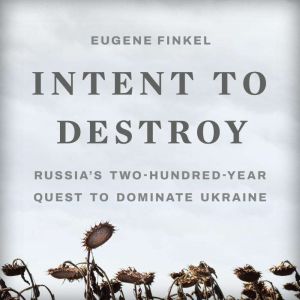

List: $27.99
| Sale: $19.59
Club: $13.99
Intent to Destroy
Russia's Two-Hundred-Year Quest to Dominate Ukraine
Author: Eugene Finkel
Narrator: Phillipe Bosher
Unabridged: 11 hr 49 min
Format: Digital Audiobook Download
Publisher: Basic Books
Published: 11/19/2024
Synopsis
The full story of how and why Russia has tried to violently subjugate Ukraine across the centuries, and how Ukrainians have resisted
Russia’s brutal invasion of Ukraine in February 2022 shocked the world. And yet, to Ukrainians, this attack was painfully familiar, the latest episode in a centuries-long Russian campaign to divide and oppress Ukraine.
In Intent to Destroy, political scientist Eugene Finkel uncovers these deep roots of the Russo-Ukrainian War. Ukraine is a key borderland between Russia and the West, and, following the rise of Russian nationalism in the nineteenth century, dominating Ukraine became the cornerstone of Russian policy. Russia has long used genocidal tactics—killings, deportations, starvation, and cultural destruction—to successfully crush Ukrainian efforts to chart an independent path. As Finkel shows, today’s violence is simply a more extreme version of the Kremlin’s long-standing policy. But unlike in the past, the people of Ukraine—motivated by the rise of democracy in their nation—have overcome their deep internal divisions. For the first time, they have united in favor of independence from Russia.
Whatever the outcome of the present war, Ukraine’s staunch resistance has permanently altered its relationship to Russia and the West. Intent to Destroy offers the vital context we need to truly understand Europe’s bloodiest conflict since World War II.
Russia’s brutal invasion of Ukraine in February 2022 shocked the world. And yet, to Ukrainians, this attack was painfully familiar, the latest episode in a centuries-long Russian campaign to divide and oppress Ukraine.
In Intent to Destroy, political scientist Eugene Finkel uncovers these deep roots of the Russo-Ukrainian War. Ukraine is a key borderland between Russia and the West, and, following the rise of Russian nationalism in the nineteenth century, dominating Ukraine became the cornerstone of Russian policy. Russia has long used genocidal tactics—killings, deportations, starvation, and cultural destruction—to successfully crush Ukrainian efforts to chart an independent path. As Finkel shows, today’s violence is simply a more extreme version of the Kremlin’s long-standing policy. But unlike in the past, the people of Ukraine—motivated by the rise of democracy in their nation—have overcome their deep internal divisions. For the first time, they have united in favor of independence from Russia.
Whatever the outcome of the present war, Ukraine’s staunch resistance has permanently altered its relationship to Russia and the West. Intent to Destroy offers the vital context we need to truly understand Europe’s bloodiest conflict since World War II.